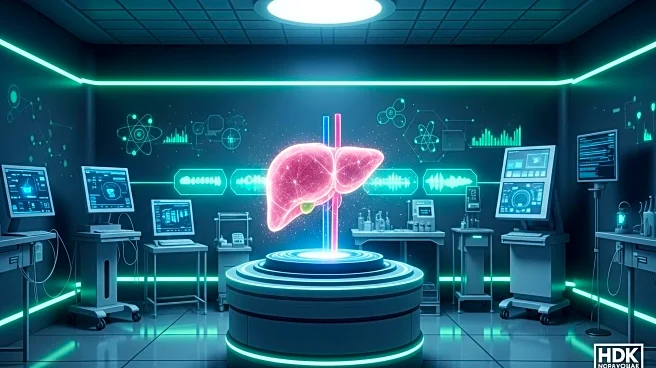What's Happening?
Novo Nordisk has announced its acquisition of Akero Therapeutics for up to $5.2 billion, focusing on Akero's experimental treatment for metabolic dysfunction-associated steatohepatitis (MASH). This condition involves fat accumulation in the liver, leading to fibrosis and potentially cirrhosis, which may require liver transplantation. Akero's drug, efruxifermin, has shown promising results in reducing fibrosis in patients with cirrhotic livers, marking it as a potential first- and best-in-class treatment for mid- to late-stage MASH. The acquisition includes an upfront payment of $4.7 billion, with an additional contingent value right of $6 per share if efruxifermin receives FDA approval for treating compensated cirrhosis.
Why It's Important?
The acquisition underscores Novo Nordisk's strategic expansion into treatments for liver diseases, complementing its existing portfolio of weight-loss drugs like Wegovy. The deal highlights the significant unmet need for effective treatments for advanced stages of MASH, a condition affecting a growing number of individuals due to rising obesity rates. By acquiring Akero, Novo Nordisk positions itself to potentially offer a groundbreaking therapy that could reverse liver damage, thereby reducing the need for liver transplants and improving patient outcomes. This move also reflects the competitive landscape in the pharmaceutical industry, as companies vie to develop innovative treatments for complex diseases.
What's Next?
Akero is currently conducting two Phase 3 studies to further evaluate efruxifermin's efficacy in reducing fibrosis. The results of these studies will be crucial in determining the drug's potential FDA approval and subsequent market release. Novo Nordisk's acquisition strategy may prompt other pharmaceutical companies to pursue similar deals, particularly in the field of liver disease treatments. Stakeholders, including healthcare providers and patients, will be closely monitoring the progress of efruxifermin's development and its impact on treatment protocols for MASH.
Beyond the Headlines
The acquisition raises ethical considerations regarding drug pricing and accessibility, as the high cost of developing novel treatments often translates into expensive therapies for patients. Additionally, the focus on MASH treatments highlights broader public health challenges related to obesity and lifestyle diseases, emphasizing the need for preventive measures alongside therapeutic interventions. The deal may also influence regulatory policies concerning drug approvals and the prioritization of treatments for diseases with high unmet needs.










